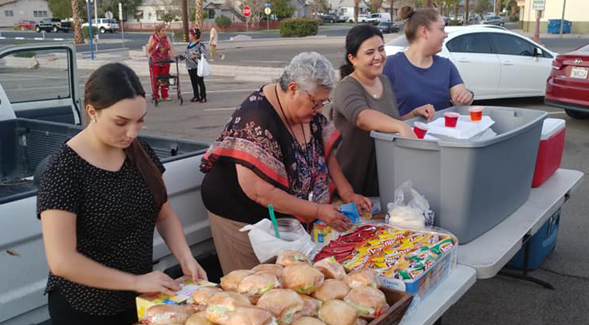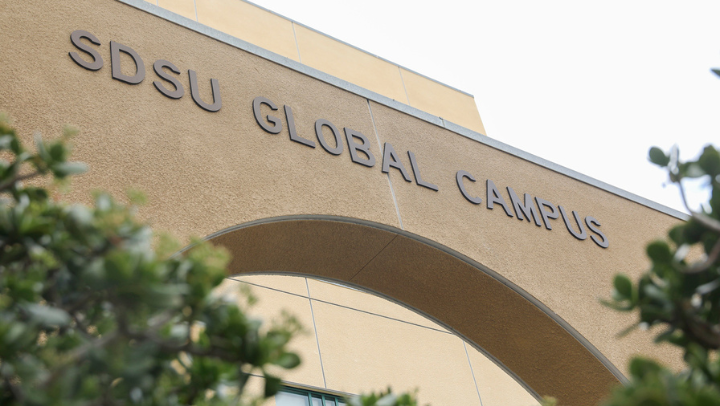Spirit of Giving: Serving the Homeless in Calexico
Staff and students at SDSU Imperial Valley join local volunteers who serve hot meals every single night and see the faces behind the numbers

“This allows us to see past preconceived notions and see others empathetically instead.”
At 7:30 p.m. on a Wednesday night at the corner of Heber Avenue and E. 3rd Street in Calexico, volunteers set up tables and serve hot, freshly cooked food to the homeless who line up in anticipation.
Carolina has been coming for dinner for five years now, ever since the volunteer group began providing meal service.
“Teníamos refugio, calor y comida. Estoy muy agradecida.” Carolina said. (“We had shelter, warmth and food. I am very grateful.”)
What began as an effort to provide temporary shelter to the homeless when freezing temperatures descended in Imperial Valley on New Year’s Eve 2014 has now evolved into the Brown Bag Coalition, a group of volunteers that take turns cooking and serving meals – every single night of the year, rain or shine.
Staff members and students of San Diego State University Imperial Valley have been involved from the beginning.
When Maribel Padilla, an active local volunteer, put out a call in 2014 seeking help with housing the homeless, her friend Norma Aguilar was among the first to respond. Aguilar, student affairs academic advisor and coordinator for the Student Ability Success Center at SDSU Imperial Valley, persuaded the Calexico Unified School District to open up the high school gym and the like-minded volunteers brought in those seeking shelter.
From shelter to meal service
What was originally envisioned as support for just a few days extended to nearly two months, with the volunteers moving the homeless from the school gym to a church and then to dome tents provided by the city council.
“It took over my life for those first weeks, I would clock out at work and go straight there and work until late night,” Aguilar said.
Aguilar and Padilla soon realized providing a hot meal daily made a world of difference for the homeless, a mix of new immigrants from south of the border, field workers, and families who had lost their housing and lived in cars or a motel room when they could afford one.
When their nightly meal service began, Aguilar noticed some guests were seniors on Social Security who came in mostly in the second half of the month when they ran out of food. On an average night, they serve about 60 to 70 people, with teams of volunteers that take turns on different nights. They also collect donations of socks, shoes, clothing, jackets, blankets, and beanies.
Relying on SDSU students
Early on, Aguilar recruited SDSU students to join their effort, and on any given week there are a handful of students that pitch in, joining the rotation of volunteers who help serve food.
Aguilar became a role model, “not only because of her leadership skills but because of her humanity,” said Viviann Ceseña, a graduate student pursuing her master’s in social work. “When you help serve, you get to see the people in the community and interact with them."
Ceseña said volunteering enabled her to see past the statistics and recognize homeless individuals are more than just numbers, they are real people.
“This allows us to see past preconceived notions and see others empathetically instead,” she said. “There are many ways one can participate, by cooking, donating, serving, it all counts and it’s all appreciated.”
Neither Aguilar nor Padilla thought their initial efforts to house people through the winter freeze would grow into a years-long initiative, helped by reliable, generous members of their community who make it possible to keep it going night after night.
“The main challenge we’ve had is that some locals think the plate of hot food we provide is what attracts a growing population of homeless to this area of Calexico, but the truth is that they’ve been here all along, just scattered,” Padilla said. “The only difference now is that at 7:30 each night they gather together to receive a much-needed meal.”
Another challenge is finding enough volunteers every night.
“But if I know it’s going to be hard to fill the roster for a particular night, I can call Norma and she will rally her students to help and they will come through,” Padilla said.
Both Aguilar and Padilla feel strongly that volunteering with the Brown Bag Coalition extends the education students and youth receive and opens their eyes up to a different world that’s right in their neighborhood. It helps serve as a reminder of how blessed they are for the opportunities they are given.
Others who help out include local businesses, families, scout troops and sports teams. When there is a particular need, Padilla posts updates on the group’s Facebook page which generates a good response.
On a recent Wednesday night, the co-founders sat down with Carolina and her partner Francisco - the couple met at the temporary high school shelter in 2014 and have been together ever since – and reminisced about how it all began, and how the Calexico community came together to support the effort with meals, donations, and service.
“Un día, quiero devolver lo que recibí; quiero alimentar a otros y lo haré, si Dios me lo permite,” Carolina said. ("One day, I want to give back what I received; I want to feed others and I will do it, God willing.")



